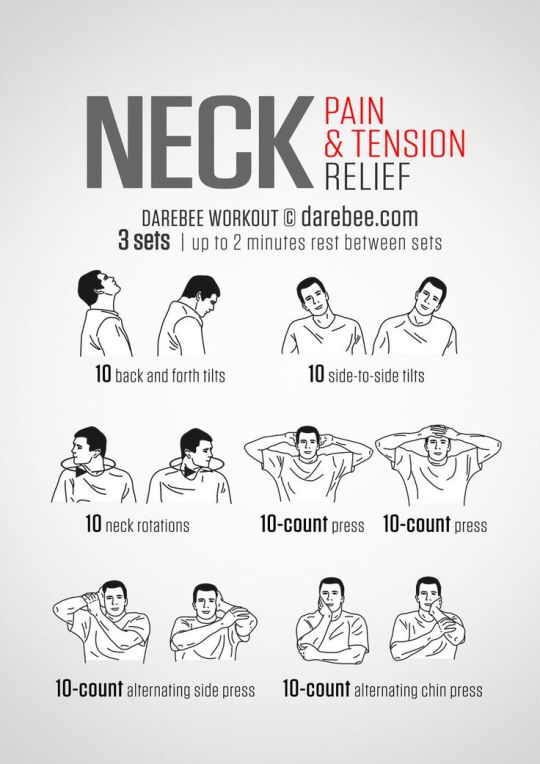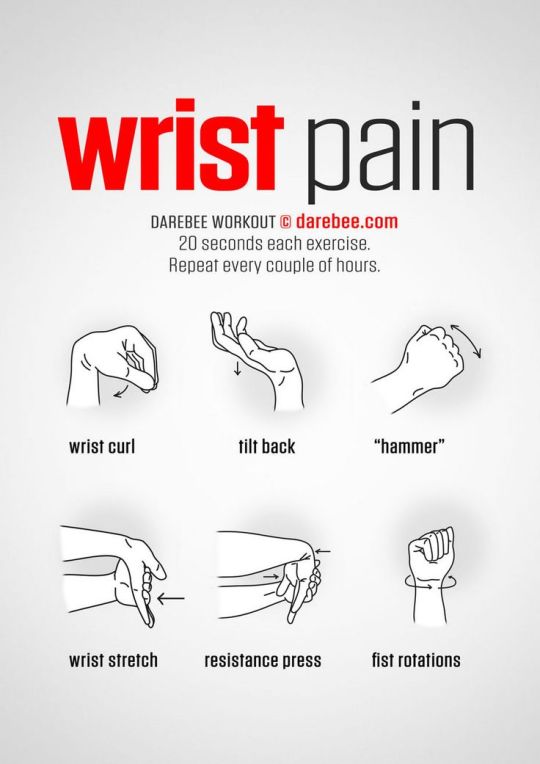Text
New: Search operators for better searching!
We hear you, and we share your frustrations: it’s hard to find a specific post. You know it has a particular tag or phrase, and it was posted on this date, or at least, within a specific year. But you can't find it!
So, today, we’re excited to announce that you can use ✨ advanced search operators ✨ in the search bar now! You can now say potato from:staff year:2021 to easily enjoy that video of a potato being microwaved again.
Before we jump into the details, a couple of caveats to note:
These search operators are only available in the main Tumblr search bar. They don’t work in the search bar in individual blogs.
The search operators only work on posts created in 2017 or later.
OK! Let’s go explore these operators!
Exact phrase match
When you surround your query with regular double quotes (not curly quotes), it will match posts with that exact phrase in the post's text content, or that exact phrase as a tag.
For example, "chappell roan is roan of arc" matches posts with that exact phrase in the content, and also matches posts that have the exact tag #chappell roan is roan of arc.
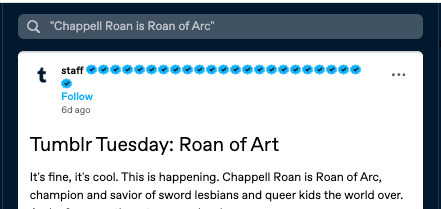
Match operator
By default, the query matches the post on either the text or the tags.
You can use match:text to specify you want to search the post content, or match:tags to search the post tags. For example:
sword world match:text looks for posts with the words "sword" and "world" in the post content.
sword world match:tags looks for posts with the words "sword" and "world" in the post tags.
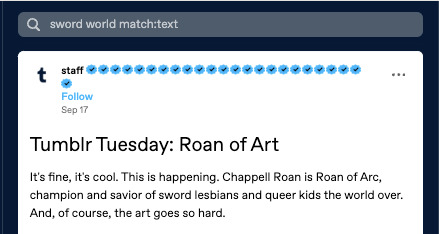
From operator
Use from:blog or from:@blog to find only posts by a particular blog.
For example, halloween from:staff finds all posts by @staff that has the word "halloween" in the post content or tags.
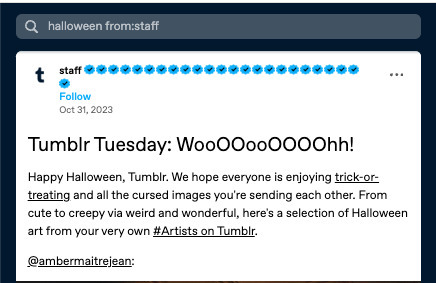
Year operator
Use year:YYYY to find posts from a particular year.
For example, halloween year:2019 finds all posts from 2019 that has the word "halloween" in the post content or tags.

Date operator
Use date:YYYY-MM-DD to find posts from a particular date.
For example, halloween date:2019-10-08 finds all posts created on October 8, 2019 that has the word "halloween" in the post content or tags.
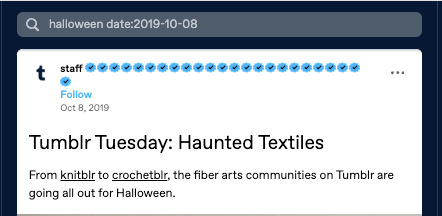
All together
You can combine all the tools above to form even more specific queries:
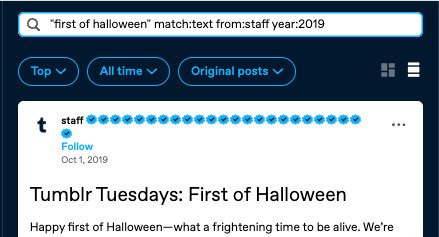
Congrats! You’re now a Tumblr search wizard! 🪄
Other syntax
As a reminder, you can already search by a tag, or by multiple tags:
Prefixing your query with # performs a tag search — that is, it will find posts with that exact tag. For example, #star wars will only return posts with the #star wars tag.
You can search for multiple tags at at time. For example, #star wars #art will find posts that are tagged with both the tag #star wars and the tag #art.
You can combine this with the new operators to find what you are looking for!
We will add a guide for this new syntax soon to our Help Center.
Tumblr Patio support
The enhanced syntax makes Tumblr Patio even more powerful. You can now open multiple search columns each with different fine-tuned queries that use the syntax above to get you customized feeds.
Feedback
We’d love to hear what you think! Please share your feedback in the replies and reblogs of this post, or by reaching out to Tumblr Support.
12K notes
·
View notes
Text
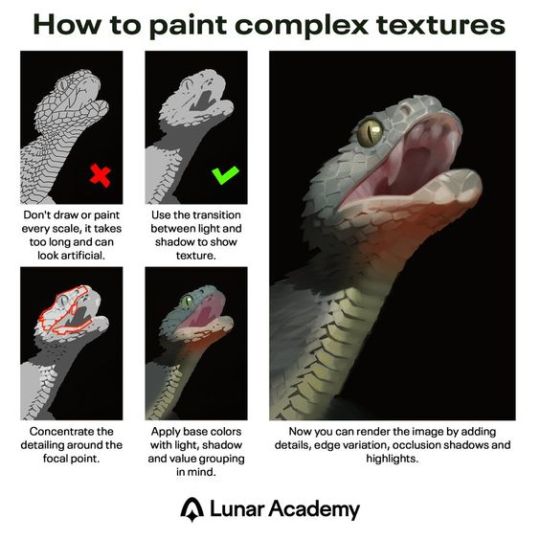
Excellent painting tutorial. In case you don't know the terms in the last description, "edge variation" means having "hard" or "soft" edges, where hard edges are crisp and good for high-detail, and soft edges are more blurry/smudged and are good for giving objects the appearance of receding in distance. In the painting above, the snake's eye uses hard edges, and its teeth and underside of the jaw use softer edges. "Occlusion shadows" are the absolute darkest parts because they are the areas where no light reaches, not even reflected or ambient light. They tend to be small and are used sparingly. Above, there's an occlusion shadow around the snake's eye. However, the shading of the eye was probably exaggerated to make it stand out more, since it's the focal point.
957 notes
·
View notes
Text
OK to make a font out of your own writing
go here
http://www.myscriptfont.com/
instead of printing it off just use this blank thing that way you dont have to scan it or anything
so fill that out by pasting it in any art program and whatnot
then save it and upload it to that site
and itll give you an option to download it
so do that and then install it BAM
546K notes
·
View notes
Text
How to avoid White Room Syndrome
by Writerthreads on Instagram
A common problem writers face is "white room syndrome"—when scenes feel like they’re happening in an empty white room. To avoid this, it's important to describe settings in a way that makes them feel real and alive, without overloading readers with too much detail. Here are a few tips below to help!
Focus on a few key details
You don’t need to describe everything in the scene—just pick a couple of specific, memorable details to bring the setting to life. Maybe it’s the creaky floorboards in an old house, the musty smell of a forgotten attic, or the soft hum of a refrigerator in a small kitchen. These little details help anchor the scene and give readers something to picture, without dragging the action with heaps of descriptions.
Engage the senses
Instead of just focusing on what characters can see, try to incorporate all five senses—what do they hear, smell, feel, or even taste? Describe the smell of fresh bread from a nearby bakery, or the damp chill of a foggy morning. This adds a lot of depth and make the location feel more real and imaginable.
Mix descriptions with actions
Have characters interact with the environment. How do your characters move through the space? Are they brushing their hands over a dusty bookshelf, shuffling through fallen leaves, or squeezing through a crowded subway car? Instead of dumping a paragraph of description, mix it in with the action or dialogue.
Use the setting to reflect a mood or theme
Sometimes, the setting can do more than just provide a backdrop—it can reinforce the mood of a scene or even reflect a theme in the story. A stormy night might enhance tension, while a warm, sunny day might highlight a moment of peace. The environment can add an extra layer to what’s happening symbolically.
Here's an example of writing a description that hopefully feels alive and realistic, without dragging the action:
The bookstore was tucked between two brick buildings, its faded sign creaking with every gust of wind. Inside, the air was thick with the scent of worn paper and dust, mingling with the faint aroma of freshly brewed coffee from a corner café down the street. The wooden floorboards groaned as Ella wandered between the shelves, her fingertips brushing the spines of forgotten novels. Somewhere in the back, the soft sound of jazz crackled from an ancient radio.
Hope these tips help in your writing!
5K notes
·
View notes
Text

Part 1 of big "how to chibi-fy this flower????" guide is here!!! 🥰

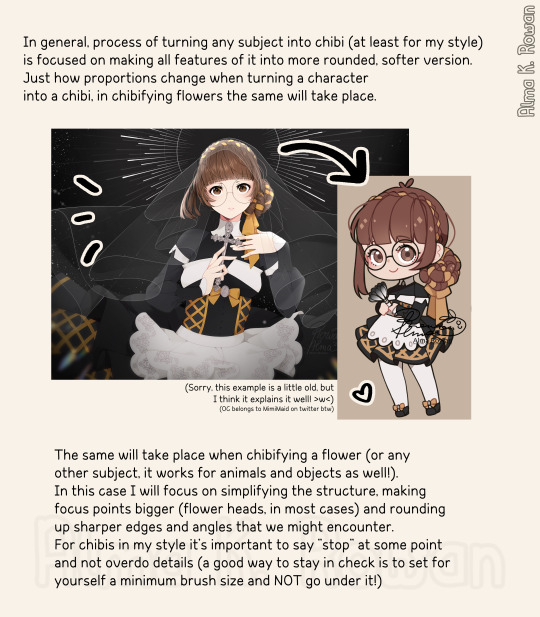


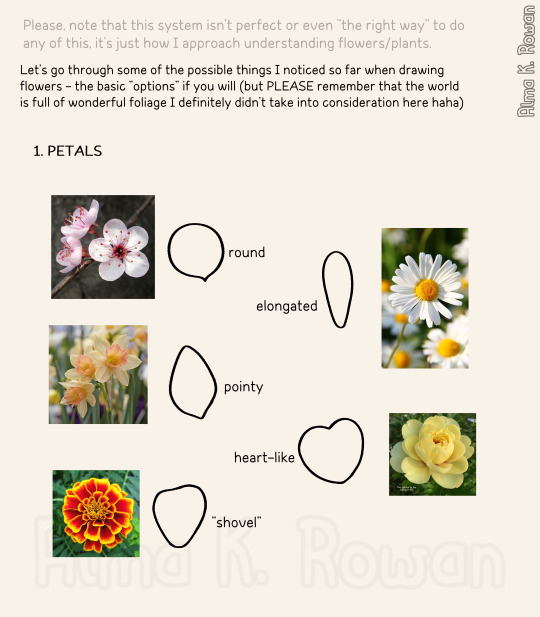

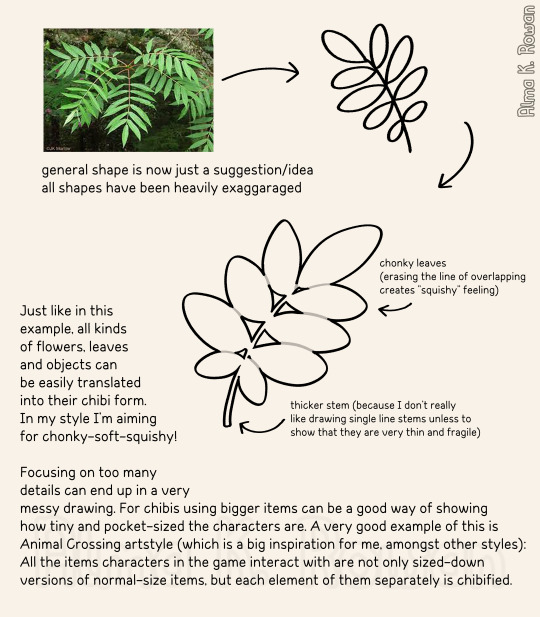




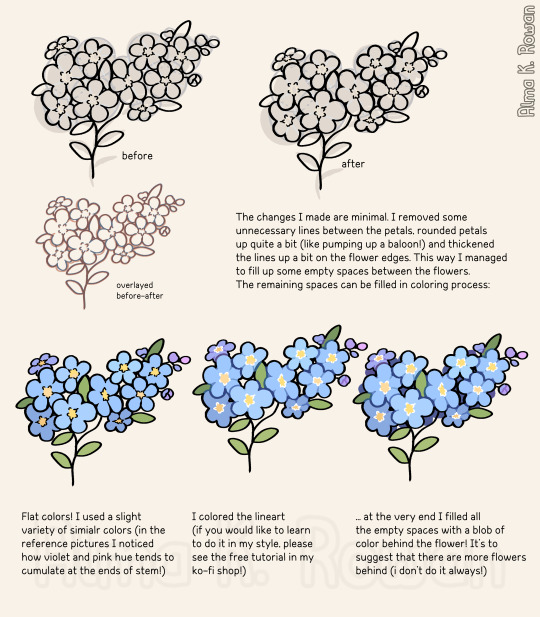
13K notes
·
View notes
Text
How to Write a Ruthless Character
A ruthless character is all about the endgame. They don’t care how they get there, lying, cheating, using others, it’s all fair game as long as they win. When writing them, show how they can cut off any distractions or emotions, making decisions that others would hesitate over.
These characters don't let feelings get in the way. Compassion, guilt, regret? Nah, they don’t have time for that. Show how they can turn off their emotions and make choices purely based on logic. They’ll do things that seem heartless to everyone else, but for them, it’s just another part of the plan. It’s not that they don’t feel anything, they just choose not to.
Boundaries? What boundaries? A ruthless character doesn’t care about rules unless they can bend them to get ahead. They’ll do things no one else dares, crossing lines others are too scared to even approach. The more uncomfortable their actions make people, the more it emphasizes just how far they’re willing to go. For them, pushing limits is just another day.
They don’t act on impulse. Every move they make is planned, and every risk they take is calculated. They weigh the pros and cons before acting, and they’re always three steps ahead of everyone else. Writing a ruthless character means showing that they’ve already figured out how to win while everyone else is still trying to figure out the rules.
Betrayal is their go-to move when things get tough. Friends, allies, even people who trust them, no one is safe. They’ll turn on anyone if it benefits them. And the best part? They’ll sleep just fine afterward. Show how others react to their betrayals, shocked, hurt, furious, while your ruthless character shrugs it off like, “It had to be done.”
4K notes
·
View notes
Text
burning text gif maker
heart locket gif maker
minecraft advancement maker
minecraft logo font text generator w/assorted textures and pride flags
windows error message maker (win1.0-win11)
FromSoftware image macro generator (elden ring Noun Verbed text)
image to 3d effect gif
vaporwave image generator
microsoft wordart maker (REALLY annoying to use on mobile)
you're welcome
141K notes
·
View notes
Text
Writing Sibling Relationships
A sibling relationship is perhaps one of the most complicated things to realistically write about. Your character dynamics and personalities will help determine their relationships but here are some things to consider:
Building their past:
Think about how they were raised. Upbringing plays a large role in impacting a person’s character, and it also helps shape relationships with siblings.
Consider their favourite memories. Good memories are important to a person, and people often seek to create new memories similar to the old good ones. On the other side, also think about their worst memories.
Who was the oldest? Who was the baby? Birth order does have some impact on personality. It also is especially important for the earliest memories.
Think about the roles that they ended up in. Siblings do, to some extent, define themselves by how they are different from each other. They pursue different interests, take on different roles, and explore different identities. These roles can be a source of self-realisation and sometimes frustration.
Giving siblings personalities:
Choose personality traits for each sibling. Even if the sibling is only a minor character, it’s important to know their basic personality.
Think about each character’s dreams, hopes, and struggles. What do they want in life? What are their goals? Every character needs something to strive for.
Figure out their insecurities. Everyone feels insecure about different things: skills, personality traits, perceived physical flaws etc.
The siblings in your story might have similar looks, qualities and characteristics. However it’s important to make them their own person too.
Keep in mind that siblings might have the same habits, sometimes without even realising it. (Personal example- My eldest brother and I do not look the same. He has green eyes, mine are brown. I have dark hair, he’s blonde. Our faces are shaped different. He takes after our mum, I take after our dad. However, we have a lot of the same habits and mannerisms. We both carry ourselves in the same way, we both quirk our eyebrows in the same manner when confused. Little things like that, that when growing up I’ve picked up from him and vice versa.)
Things siblings do: (This is a generalisation)
Siblings know how to push each others buttons.
Usually they spend so much time with each other, they know exactly how to annoy their sibling and the best way to do it.
Whatever annoys your character, his (or her) siblings already know about it. If your character’s siblings decide to get on his nerves, it shouldn’t take them very long.
Most (if not all) siblings make fun of each other to some degree. Usually they are just messing with each other. Depending on the circumstances, the insult may be forgotten almost immediately.
But it’s important to consider how siblings react when someone else is picking on their brother or sister. A lot of siblings will get defensive in this situation. Unless you have set up a reason otherwise, make sure your siblings know how to tease each other but also how to protect each other.
They rarely call each other “sis” or “bro” unless they’re trying to be annoying. This is seen a lot in films and TV but it’s not common. The occasional greeting like that is fine, but overusing it just sounds strange and unnatural.
Sibling conflict:
Siblings will argue other pretty much anything. Most of the time it’s just to get a reaction. Sometimes one will start an argument just because they’re bored.
The silent treatment! A lot of siblings, particularly children teenagers and young adults will give each other the silent treatment over the pettiest things. But it’s incredibly hard to ignore someone living in the same house as you for a long period of time.
The sibling on the receiving end of the silent treatment will usually do absurd and annoying things to get their brother or sister to speak.
Common things siblings argue about:
The tv remote
Who is going to use the bathroom first
Someone is taking too long in the bathroom
Who gets to sit in the front seat of the car
Who the favourite is
Estranged siblings:
“Sibling relationships are our longest, but it’s also an accident by birth. There are no guarantees that the siblings will grow up with similar personalities, interests or like each other,”
You should be able to find plenty of conflict amongst brothers and sisters. But most of the time there is a resolution.
If you were to fall out with a friend, you can unfriend them, you can’t un-sister a sister, whether you like it or not you’re stuck with that person in some sense.
However, some siblings do fall out and never speak to each other again. It happens, but if this happens in your story there are a few things to consider:
When asked about their family will your character acknowledge that they have siblings? Or will they claim to be an only child?
Why did they stop speaking?
Would they reconcile in times of crisis? For example, if a family member died would the siblings put aside their differences to deal with the situation?
Do they tell stories about their childhood that include the sibling?
It’s important to remember that if someone has a sibling, a lot of their childhood memories and stories from growing up will have some reference or include that sibling. It’s hard to complete cut them out, they will be mentioned at some point.
Given the entangled, long-lasting bond, what’s the price paid for suspending or ending it?
Does the sibling have other brothers or sisters whose relationships are satisfying? “
“If they have no contact with a sibling, it’s losing a shared history and there can be a sense of guilt,”
Or are your character’s relieved? Do they express a sense of relief.
“Like the end of a marriage, sibling estrangement is always sad, even when it brings relief. It’s not what anyone hoped for, but sometimes it’s the wise and necessary choice.”
Ways of bringing together estranged siblings:
Write compassion between your characters. Show them trying to see things from the sibling’s viewpoint alongside their own.
Have them say what they want from their sibling moving forward. Don’t just have your characters vent all the time. Your reader might grow tired of that.
Confirmation of love and affection:
Are the siblings in your story the type to talk about feelings? Maybe they don’t talk about it but the feeling is still there. Consider showing the depth of their relationship through actions.
(Personal example - When I was born my brothers were 4 and 6 years older than me. From what my mum has said they were both excited to have another sibling and would fight about who got to hold me first. When we were younger we used to cuddle on the sofa and play together, and frequently said I love you etc, however as we got older that stopped. I can’t remember the last time I said I love you to either of them, which sounds terrible. But it doesn’t change the fact that I know they love me and that they know I love them, we just show it and say it in different ways.)
Relationships with parents:
How did parents or caregivers react to fights between siblings?
Was there parental favouritism, real or perceived? How did the non-favourite sibling(s) react?
Do your siblings stick together when arguing with their parents?
Would your characters lie in order to prevent their brother or sister being told off by their parents?
Some siblings will join forces to tease their parents.
What if the siblings don’t have a good relationship with their parents:
If this is the case in your story, research it, google is your friend.
Try and read up on real life experiences.
Consider how the siblings view their parents. Do they stand together with the same opinion or do they have conflicting recollection of events?
Do the parents have a healthy relationship with each other? How has this impacted their children?
Writing siblings who have abusive parents:
If the siblings come from an abusive home, how has this affect their behaviour?
Do the siblings ever talk about what happened?
Do they have the share the same experience? Do they ever argue about the situation?
Are they over protective?
Has their own relationship become strained? Have they drifted apart?
Do the siblings ever acknowledge the past? If not, does this cause friction?
Common assumptions about sibling age order:
Oldest child: people pleasing, bossy, organised, punctual, natural leader, controlling, ambitious, expected to uphold family values, caretakers, financially intelligent, responsible
Middle child: flexible, easy going, independent, sometimes feels like life is unfair, sometimes will engage in attention-seeking behaviour, competitive.
Youngest child: silly or funny, risk-taking, creative, sometimes feels inferior, easily bores, friendly, outgoing, idealistic, the baby of the family.
Only child: close to parents, demanding, leaders, spoiled, self-absorbed, private in nature, may relate better to adults to kids their own age, independent, responsible
While these are common assumptions, they are not strictly true and it’s important to consider your characters personality before you apply any of these stereotypes because it may clash with how your character truly is.
Half siblings:
Half-siblings can run along several lines:
They might act like full siblings, depending on how long they’ve known each other.
They may view each other as space takers.
Your characters may feel “eh” about their half- sibling, they could just be someone who is there but they don’t have a relationship with. The half-sibling may even be a complete stranger.
Consider that they might be rivals. Are they friendly rivals or bitter rivals?
Don’t get caught up in trying to build their relationship based on what “should be” in accordance with society. As you establish these characters, let your own imagination lead you to what their relationship is. But remember that their relationship will be impacted on how the parents treat them too.
(@its-the-tear-in-my-heart thanks for asking about sibling relationships. This post is more generalised than your question but I hope it helped in some way.)
4K notes
·
View notes
Text
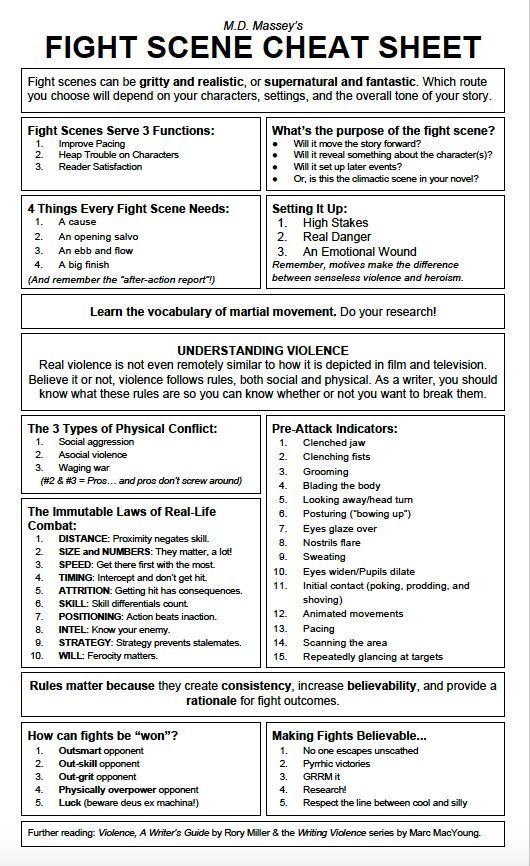
Writing tool for your fight scenes.
8K notes
·
View notes
Text
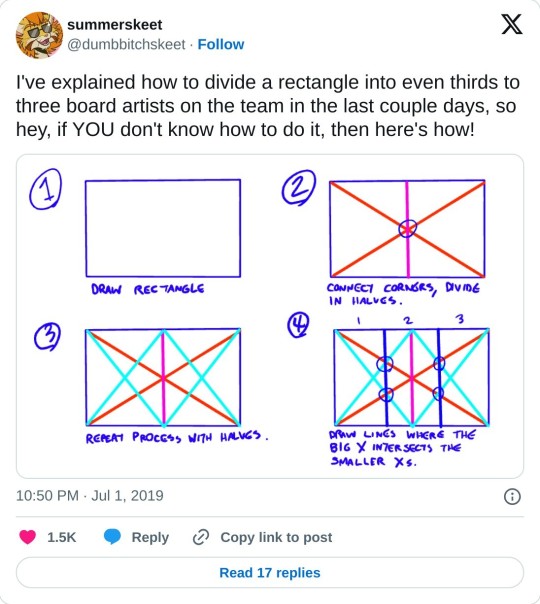
really helpful technique ^ once you know how to divide by halves and thirds it makes drawing evenly spaced things in perspective waaay easier:


111K notes
·
View notes
Text
helpful sites for writers
i have a little collection of websites i tend to use for coming up with ideas, naming people or places, keeping clear visuals or logistics, writing basics about places i've never been to, and so on. i tend to do a lot of research, but sometimes you just need quick references, right? so i thought i'd share some of them!
Behind the Name; good for name meanings but also just random name ideas, regardless of meanings.
Fantasy Name Generator; this link goes to the town name generator, which i use most, but there are lots of silly/fun/good inspo generators on there!
Age Calculator; for remembering how old characters are in Y month in Z year. i use this constantly.
Height Comparison; i love this for the height visuals; does character A come up to character B's shoulder? are they a head taller? what does that look like, height-wise? the chart feature is great!
Child Development Guide; what can a (neurotypical, average) 5-year-old do at that age? this is a super handy quickguide for that, with the obviously huge caveat that children develop at different paces and this is not comprehensive or accurate for every child ever. i like it as a starting point, though!
Weather Spark; good for average temperatures and weather checking!
Green's Dictionary of Slang; good for looking up "would x say this?" or "what does this phrase mean in this context?" i love the timeline because it shows when the phrase was historically in use. this is english only, though; i dig a little harder for resources like this in other languages.
11K notes
·
View notes
Text
Skip Google for Research
As Google has worked to overtake the internet, its search algorithm has not just gotten worse. It has been designed to prioritize advertisers and popular pages often times excluding pages and content that better matches your search terms
As a writer in need of information for my stories, I find this unacceptable. As a proponent of availability of information so the populace can actually educate itself, it is unforgivable.
Below is a concise list of useful research sites compiled by Edward Clark over on Facebook. I was familiar with some, but not all of these.
⁂
Google is so powerful that it “hides” other search systems from us. We just don’t know the existence of most of them. Meanwhile, there are still a huge number of excellent searchers in the world who specialize in books, science, other smart information. Keep a list of sites you never heard of.
www.refseek.com - Academic Resource Search. More than a billion sources: encyclopedia, monographies, magazines.
www.worldcat.org - a search for the contents of 20 thousand worldwide libraries. Find out where lies the nearest rare book you need.
https://link.springer.com - access to more than 10 million scientific documents: books, articles, research protocols.
www.bioline.org.br is a library of scientific bioscience journals published in developing countries.
http://repec.org - volunteers from 102 countries have collected almost 4 million publications on economics and related science.
www.science.gov is an American state search engine on 2200+ scientific sites. More than 200 million articles are indexed.
www.pdfdrive.com is the largest website for free download of books in PDF format. Claiming over 225 million names.
www.base-search.net is one of the most powerful researches on academic studies texts. More than 100 million scientific documents, 70% of them are free
239K notes
·
View notes
Text
Words to use instead of ‘said’
**Using the word ‘said’ is absolutely not a bad choice, and in fact, you will want to use it for at least 40% of all your dialogue tags. Using other words can be great, especially for description and showing emotion, but used in excess can take away or distract from the story.
Neutral: acknowledged, added, affirmed, agreed, announced, answered, appealed, articulated, attested, began, bemused, boasted, called, chimed in, claimed, clarified, commented, conceded, confided, confirmed, contended, continued, corrected, decided, declared, deflected, demurred, disclosed, disputed, emphasized, explained, expressed, finished, gloated, greeted, hinted, imitated, imparted, implied, informed, interjected, insinuated, insisted, instructed, lectured, maintained, mouthed, mused, noted, observed, offered, put forth, reassured, recited, remarked, repeated, requested, replied, revealed, shared, spoke up, stated, suggested, uttered, voiced, volunteered, vowed, went on
Persuasive: advised, appealed, asserted, assured, begged, cajoled, claimed, convinced, directed, encouraged, implored, insisted, pleaded, pressed, probed, prodded, prompted, stressed, suggested, urged
Continuously: babbled, chattered, jabbered, rambled, rattled on
Quietly: admitted, breathed, confessed, croaked, crooned, grumbled, hissed, mumbled, murmured, muttered, purred, sighed, whispered
Loudly: bellowed, blurted, boomed, cried, hollered, howled, piped, roared, screamed, screeched, shouted, shrieked, squawked, thundered, wailed, yelled, yelped
Happily/Lovingly: admired, beamed, cackled, cheered, chirped, comforted, consoled, cooed, empathized, flirted, gushed, hummed, invited, praised, proclaimed, professed, reassured, soothed, squealed, whooped
Humour: bantered, chuckled, giggled, guffawed, jested, joked, joshed
Sad: bawled, begged, bemoaned, blubbered, grieved, lamented, mewled, mourned, pleaded, sniffled, sniveled, sobbed, wailed, wept, whimpered
Frustrated: argued, bickered, chastised, complained, exasperated, groaned, huffed, protested, whinged
Anger: accused, bristled, criticized, condemned, cursed, demanded, denounced, erupted, fumed, growled, lied, nagged, ordered, provoked, raged, ranted remonstrated, retorted, scoffed, scolded, scowled, seethed, shot, snapped, snarled, sneered, spat, stormed, swore, taunted, threatened, warned
Disgust: cringed, gagged, groused, griped, grunted, mocked, rasped, sniffed, snorted
Fear: cautioned, faltered, fretted, gasped, quaked, quavered, shuddered, stammered, stuttered, trembled, warned, whimpered, whined
Excited: beamed, cheered, cried out, crowed, exclaimed, gushed, rejoiced, sang, trumpeted
Surprised: blurted, exclaimed, gasped, marveled, sputtered, yelped
Provoked: bragged, dared, gibed, goaded, insulted, jeered, lied, mimicked, nagged, pestered, provoked, quipped, ribbed, ridiculed, sassed, teased
Uncertainty/Questionned: asked, challenged, coaxed, concluded, countered, debated, doubted, entreated, guessed, hesitated, hinted, implored, inquired, objected, persuaded, petitioned, pleaded, pondered, pressed, probed, proposed, queried, questioned, quizzed, reasoned, reiterated, reported, requested, speculated, supposed, surmised, testified, theorized, verified, wondered
This is by no means a full list, but should be more than enough to get you started!
Any more words you favor? Add them in the comments!
Happy Writing :)
15K notes
·
View notes
Note
tutorial idea: how to draw teeth / toothy smiles!! i think teeth are difficult for a lot of artists, esp me. im terrible with drawing smiles with teeth. So I would really appreciate if you made a tutorial for teeth! /gen /nf. Thank you.



Your wish is my command, dear anon!
[Transcript]
->Gums show a little
→ Smiling pushes cheeks out
Mouth corners look like triangles with lil' hooks
A closed-mouth natural smile will show the top teeth only
There are four incisors (the flat ones) followed by a canine & five molars on either side
I usually group the incisons together fon a more stylised look
While smiling, the lips stretch and look thinner
Start with simple shapes and work your way up to detail!
4K notes
·
View notes



